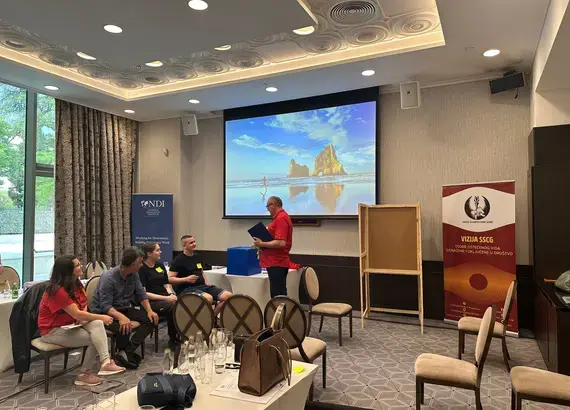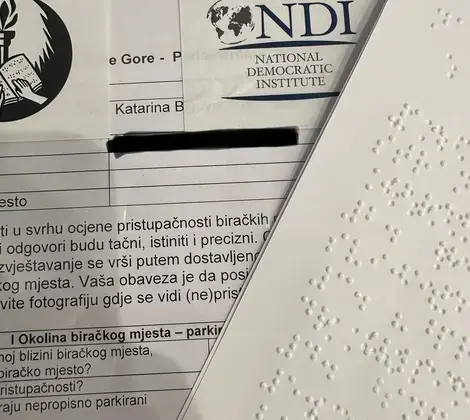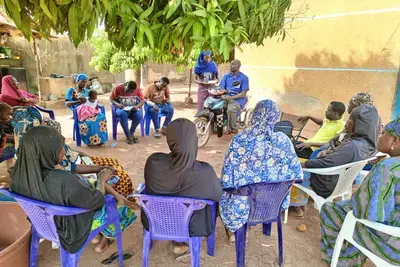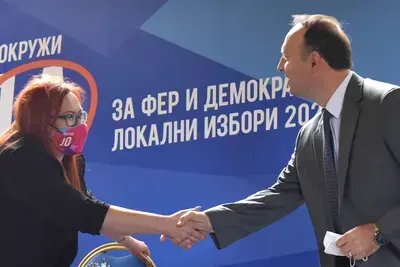
Success Story
Advancing Electoral Rights for Persons with Disabilities in Montenegro
"Election day was dynamic and challenging. As an operator, I heard many field experiences and better understood the obstacles faced by persons with disabilities in exercising their voting rights.." - An election day call center operator.
During the June 2023 elections in Montenegro, the Union of the Blind—an organization advancing the rights of people with disabilities since 1947—conducted the first systematic election monitoring in Montenegro. The organization collected and analyzed data on the accessibility of polling stations and election materials for people with diverse disabilities in order to build a foundation for future policy advocacy efforts. The importance of findings of the Union’s trailblazing observation mission was recognized by the European Union in its report on Montenegro, emphasizing the need for findings and recommendations to be considered in the long-awaiting electoral reform.
There is no precise data on the number of people with disabilities in Montenegro, but the official World Health Organization (WHO) estimates note that approximately 15 to 20 percent of the population is composed of people with disabilities. In Montenegro, people with disabilities are routinely denied access to many aspects of public and political life. Inaccessible physical spaces, discriminatory social attitudes, a systematic lack of educational and employment opportunities, and other barriers frequently deprive these citizens of their civic voice. This marginalization is often compounded for women and young people with disabilities, as well as members of underrepresented communities.
The Convention on the Rights of Persons with Disabilities (CRPD), which Montenegro signed in 2007, grants citizens with disabilities equal treatment under the law, including the ability to fully participate in political life. It has provided an opportunity for people with disabilities in Montenegro to better hold government stakeholders accountable on issues important to them and to engage Montenegro’s State Election Commission (SEC) in terms of their international commitments. Montenegro’s SEC, in cooperation with civil society organizations (CSOs) and disabled people’s organizations (DPOs), developed by-laws requiring polling stations to secure accessible voting for people with disabilities. The 2023 parliamentary elections presented an opportunity to evaluate these statutes in practice.

With assistance from the National Democratic Institute (NDI), the Union of the Blind trained and deployed 50 observers, including people with diverse disabilities, to observe the implementation of accessibility standards in five areas: polling station surroundings (i.e., accessible parking); access route (i.e., access ramps, curbs, stairs); entrance area; polling board operations (i.e., composition); and voting area. Inside the polling stations, observers measured the entrance door width, the height of the threshold, the height of shelves inside voting booths, and the height at which ballot boxes were positioned, as specific heights/widths are prescribed in the aforementioned by-laws. Additionally, observers evaluated whether assistive devices were made available to voters with diverse disabilities, such as ballot paper templates and brochures in Braille, as well as carpet strips to assist voters with visual disabilities to cast their votes independently and move freely throughout the registration, voting and exit procedures.
Through their systematic monitoring of the elections, the Union of the Blind visited a total of 505 polling stations, or approximately 44 percent of polling stations in Montenegro, to evaluate their physical accessibility for people with diverse disabilities, inclusive of the height, width, and mobility accessibility of polling stations and voting booths. The Union of the Blind of Montenegro also found that opportunities for people with disabilities to serve in leadership roles in Montenegro are lacking, with people with disabilities comprising only 3.4 percent of polling board members in electoral management bodies that the Union visited on election day.
Despite the State Election Commission’s efforts, the majority of observed polling stations displayed structural or logistical deficiencies that impeded the voting rights of people with disabilities. Surrounding areas were largely inaccessible (87 percent), as well as the access routes (42 percent). Polling station entrance areas were not fully accessible at 84 percent of the observed polling stations. Approximately 21 percent of the observed polling stations were fully accessible to people with visual disabilities, and 52 percent were accessible to persons of short stature and wheelchair users, which means that those voters faced considerable physical obstacles to casting their vote. These discriminatory practices hinder the equal participation of people with disabilities, including their right to vote and be elected.
Traditionally, people with disabilities are marginalized in political, social, and economic spheres, and public awareness of the importance of providing reasonable accommodations to ensure equal political rights for people with disabilities is lacking. In its report on Montenegro, the United Nations (UN) Committee on the Rights of People with Disabilities noted with grave concern that there were still certain physical and information barriers regarding the voting process. The Committee recommended Montenegro amend its electoral laws and rules of procedures in order to: (a) Provide all people with disabilities with an opportunity to vote and stand for elections; and (b) Ensure barrier-free access to voting, provide mechanisms to ensure the secrecy of the ballot regardless of the type of disability and accessibility of other voting material such as information in accessible formats in accordance to the General Comment No. 2 on accessibility, issued by the Committee as CRPD implementation guidance.
While Montenegro is one of the few countries in the Western Balkans whose legal frameworks protect the rights of people with disabilities to participate in political and electoral life on an equal basis as others, there remain significant gaps in the implementation of these legal mandates. The Union of the Blind’s systematic monitoring aimed to determine the extent to which these legal commitments were respected. In particular, the observation examined the implementation of the Rules on Designation, which cover polling station setup and measures for ensuring the secrecy of the ballot, as well as the Rules on uniform standards for election material, both of which were adopted by the State Election Commission and are mandatory for all municipal election commissions and polling boards. The Union recruited several people with disabilities as election observers and call-center staff, setting an example for the composition of election boards at all levels in the future.
In the post-election period, the Union published and presented its final observation report (attached) with detailed findings and recommendations for government authorities, CSOs and DPOs to advocate for the improvement of electoral rights for people with disabilities in Montenegro and the elimination of discrimination toward the new parliamentary convocation.
NDI’s work in Montenegro and across the globe seeks to ensure the full inclusion of people with disabilities in all aspects of public and political life through support to local DPOs advancing those rights. In Montenegro, NDI includes people with disabilities in work related to the wider NDI portfolio, inclusive of electoral reform discussions and co-creation processes for the Open Government Partnership (OGP) national action plan. Globally, NDI helps people with disabilities participate in activities that get them involved in mainstream politics and take collective action around issues related to their disability, such as ensuring access to polling places or obtaining sign language translation in schools. These initiatives seek to support people with disabilities to engage politically and become full members of society with the rights, responsibilities and respect afforded all citizens in a democracy.


